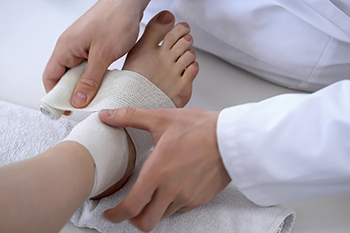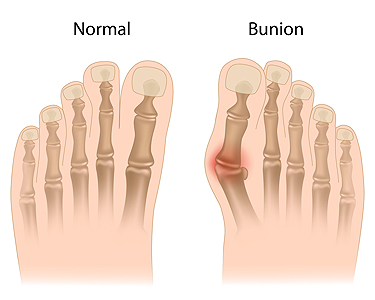Stuart (772) 223-8313Rate Us
Jupiter (561) 744-6683Rate Us
Stuart (772) 223-8313Rate Us
Jupiter (561) 744-6683Rate Us

An acute ankle sprain refers to a sudden and unexpected injury to the ligaments that support the ankle joint. These ligaments can become stretched or torn when the foot twists or turns beyond its normal range of motion. This injury often results from a misstep, an awkward landing, or a sudden change in direction, such as in sports activities. The causes of an acute ankle sprain are typically linked to excessive or forceful movements that strain the ankle ligaments. Common situations include stumbling on uneven ground, stepping off of a curb, or rolling the ankle during sports activities, such as basketball or soccer. Wearing high heels and poorly fitting footwear can also increase the risk of ankle sprains by destabilizing the ankle. Understanding the definition and causes of an acute ankle sprain is essential for both prevention and timely treatment. If you have sprained your ankle, it is strongly suggested that you consult a podiatrist who can accurately diagnose this condition, and offer treatment methods that are right for you.
Ankle sprains are common but need immediate attention. If you need your feet checked, contact one of our podiatrists from Advanced Foot & Ankle Specialists, PA. Our doctors can provide the care you need to keep you pain-free and on your feet.
How Does an Ankle Sprain Occur?
Ankle sprains take place when the ligaments in your ankle are torn or stretched beyond their limits. There are multiple ways that the ankle can become injured, including twisting or rolling over onto your ankle, putting undue stress on it, or causing trauma to the ankle itself.
What Are the Symptoms?
Preventing a Sprain
Treatment of a Sprain
Treatment of a sprain depends on the severity. Many times, people are told to rest and remain off their feet completely, while others are given an air cast. If the sprain is very severe, surgery may be required.
If you have suffered an ankle sprain previously, you may want to consider additional support such as a brace and regular exercises to strengthen the ankle.
If you have any questions please feel free to contact one of our offices located in Stuart and Jupiter, FL . We offer the newest diagnostic and treatment technologies for all your foot and ankle needs.

Bunions, those bony protrusions that form at the base of the big toe, can be both painful and unsightly. Recognizing the symptoms of bunions is essential to address this common foot condition effectively. One of the most apparent signs is the visible bump on the side of the big toe, which may be accompanied by redness and swelling. Bunions often cause pain, which can range from mild to severe, especially when wearing tight shoes or engaging in activities that put pressure on the affected area. Over time, the big toe may start to deviate towards the other toes, causing further discomfort and potentially leading to complications like hammertoes. Apart from the physical symptoms, bunions can impact daily life by limiting choice of footwear and causing difficulty in finding comfortable, supportive shoes. Early intervention can help alleviate pain and prevent the condition from worsening, making it vital to recognize the signs and seek professional advice from a podiatrist to address bunions and regain foot comfort and functionality. If you see symptoms of a bunion developing, it is suggested that you schedule an appointment with a podiatrist who can offer you various forms of relief and effective treatment methods.
If you are suffering from bunion pain, contact one of our podiatrists of Advanced Foot & Ankle Specialists, PA. Our doctors can provide the care you need to keep you pain-free and on your feet.
What Is a Bunion?
Bunions are painful bony bumps that usually develop on the inside of the foot at the joint of the big toe. As the deformity increases over time, it may become painful to walk and wear shoes. Women are more likely to exacerbate existing bunions since they often wear tight, narrow shoes that shift their toes together. Bunion pain can be relieved by wearing wider shoes with enough room for the toes.
Causes
Symptoms
In order to diagnose your bunion, your podiatrist may ask about your medical history, symptoms, and general health. Your doctor might also order an x-ray to take a closer look at your feet. Nonsurgical treatment options include orthotics, padding, icing, changes in footwear, and medication. If nonsurgical treatments don’t alleviate your bunion pain, surgery may be necessary.
If you have any questions, please feel free to contact one of our offices located in Stuart and Jupiter, FL . We offer the newest diagnostic and treatment technologies for all your foot care needs.

The elderly are more prone to foot problems due to a combination of age-related physical changes, accumulated wear and tear, and other health factors. As people age, the skin becomes thinner, less elastic, and loses its natural oils, making it more susceptible to dryness, cracking, and infections. The fat pads on the bottom of the feet, which provide cushioning, tend to thin out, leading to decreased shock absorption and increased sensitivity to pressure points. Additionally, circulation can diminish, slowing down the healing process and increasing the risk of infections. Over time, joints can become stiff and lose their range of motion due to conditions such as arthritis. Chronic diseases including diabetes can also have significant effects on foot health, increasing vulnerability to nerve damage and poor circulation. Years of bearing body weight and wearing various types of footwear can result in structural changes like bunions, hammertoes, and collapsed arches. If you are elderly or taking care of an older person, it is suggested that you routinely schedule appointments with a podiatrist for examinations and regular foot care.
Proper foot care is something many older adults forget to consider. If you have any concerns about your feet and ankles, contact one of our podiatrists from Advanced Foot & Ankle Specialists, PA. Our doctors can provide the care you need to keep you pain-free and on your feet.
The Elderly and Their Feet
As we age we start to notice many changes in our body, but the elder population may not notice them right away. Medical conditions may prevent the elderly to take notice of their foot health right away. Poor vision is a lead contributor to not taking action for the elderly.
Common Conditions
Susceptible Infections
Diabetes and poor circulation can cause general loss of sensitivity over the years, turning a simple cut into a serious issue.
If you have any questions please feel free to contact one of our offices located in Stuart and Jupiter, FL . We offer the newest diagnostic and treatment technologies for all your foot and ankle needs.